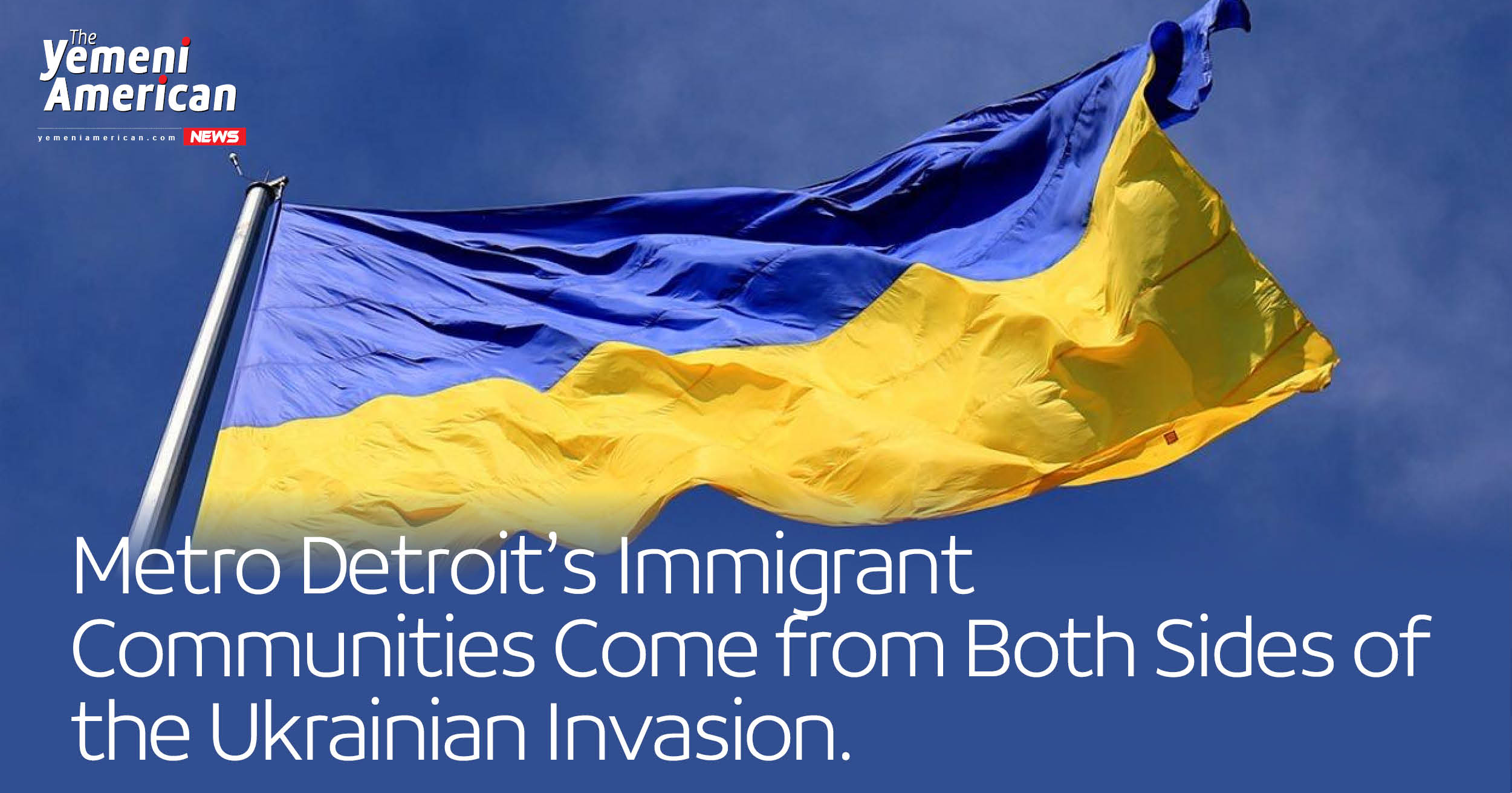Metro Detroit’s Immigrant Communities Come from Both Sides of the Ukrainian Invasion.
By Simon Albaugh – Yemeni American News
Detroit, Mich. – We all remember how agonizingly slow the days were before Ukraine’s invasion. While Russian military exercises slowly pierced the borders of Ukraine’s sovereign land, people all over the world held their breath over what would happen next. Videos frenetically circulated social media feeds about Putin’s relationship with Ukraine, NATO and the West itself, and the United States Government spoke strongly about the power of what sanctions could do to the Russian Elite.
For a small amount of context, back in 2021 Russian President Vladimir Putin put forward a list of demands on NATO Countries in order to de-escalate tensions in Eastern Europe. Those demands, which call for Ukraine to never join NATO and getting NATO arms out of Eastern Europe, among other demands, were introduced as Russia began amassing troops near the Ukrainian Border.
Since those demands were not considered by Western countries, Russia moved forward with an invasion of Ukraine beginning on Feb. 24. The initial invasion, which included offensives toward Kyiv, Mariupol and many other major Ukrainian cities, has already continued into late March. But for people in the Ukrainian American Community, this has been an extremely difficult time.
Two days into the invasion of Ukraine, I sat down with my friend Natalia (whose name has been changed for privacy) over lunch. She used to live near Ternopil as a child before emigrating to the United States. I asked her to come to a restaurant in Detroit’s Midtown neighborhood, thinking a friend and I would show some support and buy her a meal.
She came in from work with nerves shot and a shaking grip on her glass of water. Natalia explained that she and her family were trying to restart contact with her family friends in the besieged country. They were trying to evacuate from Kyiv before any offensive reached Ukraine’s capital city. “I’m feeling very nervous,” she finally said.
With an outpouring of support and solidarity, people around the country have rallied behind the Ukrainian cause. Zelensky and his ragtag army of Davids fighting the Goliath of Putin’s military offensive have become a media narrative that seems to be sticking. And rightly so, because the security of a sovereign country has been breached.
In response to the full-scale invasion of Ukraine, Biden and US Allies promised Economic Sanctions meant to specifically target the Russian Oligarchs closest to the Putin regime, along with Russian financial institutions and Russian access to Western financial infrastructure.
“Starting tomorrow and continuing into the days ahead, we’ll also impose sanctions against Russia’s elite and their family members,” Biden said in a Feb. 22 press conference. “They share in the corrupt gains of the Kremlin policies and should share in the pain as well.”
There’s only one problem with these economic sanctions, explains Joseph Wright and Abel Escriba-Folch – political science professors for Penn State and Pompeu Fabra University – and it has to do with Oil.
In an article penned by the two Professors, they talk about how economic sanctions have been successfully used in the past to destabilize autocratic regimes. For example, Idi Amin of Uganda lost the support of his political elite because of economic sanctions that prevented him from funding the lavish lifestyle of his supporters.
Economic Sanctions as a way to destabilize regimes that are committing human rights abuses has a lot of successful examples. “There is, however, one important caveat to the rule that sanctions make it more likely that autocracies lose power,” the article says. “Sanctions, historically have not destabilized dictatorships of any stripe that are substantial petroleum exporters.”
“If sweeping international sanctions could somehow choke oil and gas export revenue for the Russian regime, that might destabilize Putin’s regime,” the article reads. “But Western governments have yet to impose those kinds of sanctions. And even if they did, non-Western demand for Russia’s oil and gas could “bust” Western sanctions, with other countries and companies buying Russian exports at a cost below the world market price.”
It’s no surprise to some that everyday Russians, whether they support the invasion or have protested the Putin regime’s aggression toward its neighbor, are bearing the brunt of economic sanctions. The cost of consumer goods are quickly rising and foreign services and companies are quickly leaving the country.
This is by no means equivalent to the Human Rights Abuses that are being experienced by Ukrainians who have lost their homes and livelihoods, having to give up their security to defend their homeland against an autocratic military.
Still, for one member of Metro Detroit’s Russian-American community, the focus is on both the everyday Russians and Ukrainians who are losing their lives every day. Maria, whose name has also been changed, was born in Kazakhstan to Russian parents. After the fall of the Soviet Union, her family was ostracized by the native Kazakh people in the former Soviet Bloc state.
Maria says that she doesn’t want to be vocal about her support for the Ukrainian people because of her family’s experience in her native Kazakhstan. And yet, she also can’t keep her focus away from Russia because of her family’s conflicted opinions surrounding the invasion. “I just don’t like to think about it,” she said.
As of last year, there are over 40 ongoing conflicts throughout the world. All these wars have their aggressors and defenders, their Davids and Goliaths, their martyrs and their everyday people caught in the middle of it. In the United States, where we’re removed to varying degrees from those conflicts and the struggle that they cause, it’s imperative to call out injustice, while always demanding a just response to it.













